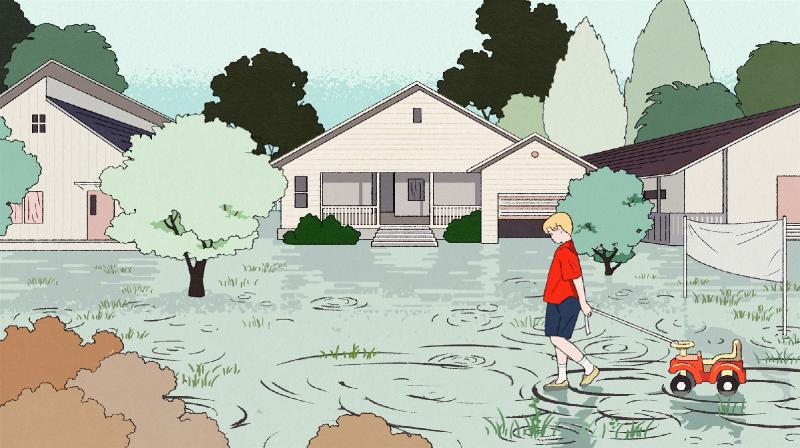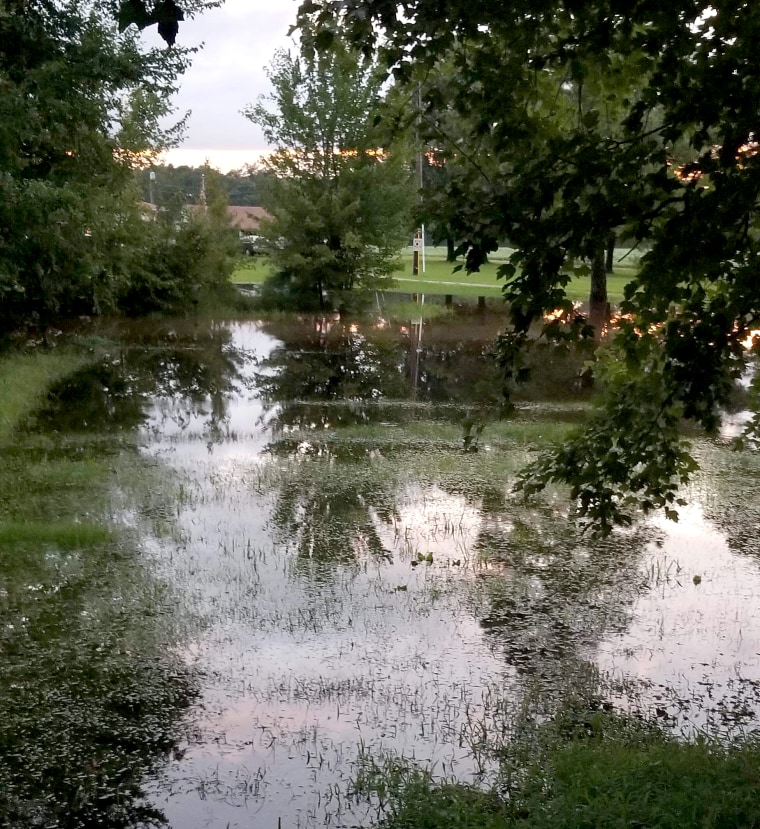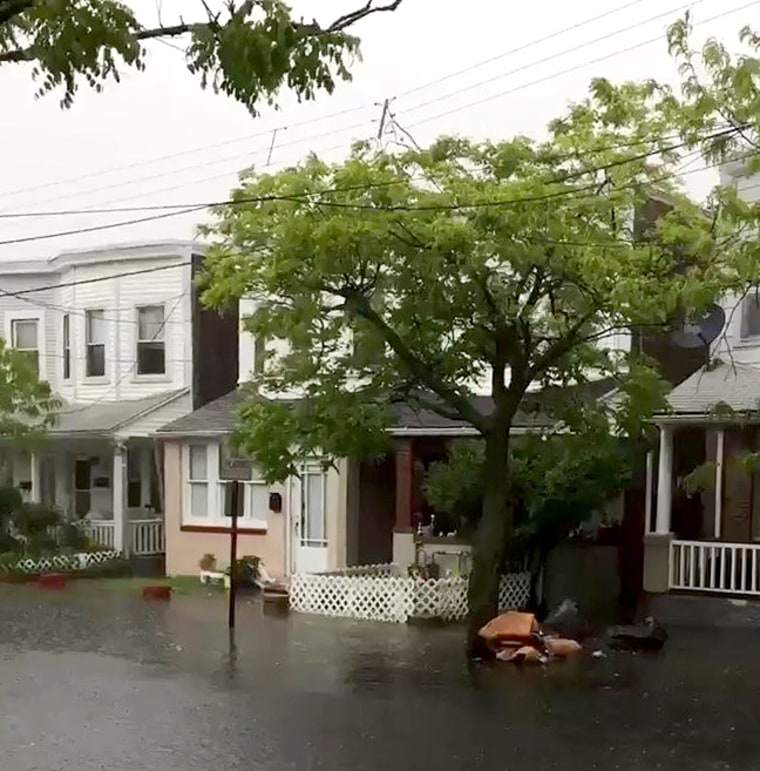Along the East Coast, rainy days, high tides and sea rise make floods a part of life



Flooding is becoming a way of life along the Mid-Atlantic coast.
In Atlantic City, New Jersey, residents along one street deal with ankle-deep flood waters on a rainy day, with even higher floodwaters arriving with every new moon.
In southern Virginia Beach, Virginia, a bit of rain and a strong wind from the south is enough to bring water from the Back Bay onto farmland.
And in Norfolk’s Hague neighborhood, high tides spill water from the Elizabeth Creek into the streets, making roads impassable, damaging cars and snarling traffic. Flooding has become so common that Norfolk resident Kiquanda Baker says residents will cancel plans if rain is in the forecast.
“It's becoming where people have to plan around water,” Baker said.
Those in the Chesapeake Bay area say that flooding has become an increasingly persistent problem in the last two decades. Scientists say that things will only get worse, as the area is ground zero for rising seas on the East Coast.
Sea levels have risen across the entire coast, but nowhere as high as in the Mid-Atlantic region. And experts say the trend will only accelerate because of climate change, putting coastal residents from North Carolina to New Jersey at increased risk of flooding.
From 1900 to 2017, sea levels rose about a foot and a half along the Chesapeake Bay, compared to one foot in New York City and Miami, according to a December 2018 study by researchers at the Woods Hole Oceanographic Institution in Massachusetts.
Scientists say there are multiple causes for the rise in sea levels. The Virginia Institute of Marine Science points to melting ice in Greenland and Antarctica and changing ocean currents. Researchers at Woods Hole attribute the differences to “post-glacial rebound,” or the way the earth’s surface has slowly re-arranged itself since the end of the last ice age.
But they all say that it will only get worse.
Chris Piecuch, the lead researcher for the Woods Hole study, says sea rise is a particular danger for those in the Mid-Atlantic.
“Climate change is warming sea temperatures and raising sea levels everywhere, but folks in places like North Carolina have a double whammy,” Piecuch said.
Higher waters pose multiple risks, experts say. Coastal regions can flood at high tide, even on sunny days. And during rainstorms, backed-up drainage systems can inundate inland areas.
“If you get a really heavy rain event and the storm sewer is closed off because of the high tide, the rain can't drain,” said Molly Mitchell, a marine scientist at the Virginia Institute for Marine Science.
The effects are already being felt in cities along the Chesapeake Bay, like Norfolk, where rain will snarl Tidewater Drive, a major north-south roadway, said Baker, the resident who works for the nonprofit Chesapeake Climate Action Network in Norfolk.
But, the problem isn’t confined to rainy days. “We have sunny day flooding where half of my office is surrounded by floodwater,” Baker says.
In Virginia Beach, residents who survived a direct hit from Hurricane Matthew in October 2016 created a Facebook page to pressure officials about repeated flooding in the area. The page has since attracted more than 1,700 followers.
One resident, Conrad Schesventer, who ran an unsuccessful bid for city council last year on a platform of modernizing the drainage system, said floodwaters can rise so quickly that his car has flooded after only a few minutes of heavy rain.
“This wasn't related to any tropical system. It’s just a heavy thunderstorm,” Schesventer said. “Stuff like that we didn't use to see.”
Melissa Stillman’s home in Virginia Beach's Bird Neck neighborhood sits 6 feet above sea level. Homes in her area have drainage ditches that feed rainwater to a nearby creek.
During the rainy summer months, streets around the neighborhood flood up to four times a month, Stillman said. And flood waters are getting closer to her home than ever.
"This is the first year that just during a heavy rainstorm the water was backing up in our yard, getting close to our house," Stillman said.
In Pungo, a neighborhood in southern Virginia Beach, locals are wary of winds. Pungo is one of several neighborhoods in the area that suffer from flooding when winds come in from the south, blowing water from the Back Bay into streets and onto properties.

Flooding in Virginia Beach, Virginia on July 24, 2018. Suzee Ferg
Suzee Ferg, who has lived in Pungo for 30 years, said that wind causes floods in the area at least once a month, in addition to weekly rain-related floods.
"I've had water over 3 feet at my back door six times," Ferg wrote NBC News via Facebook Messenger. "Emergency vehicles can not get in. The school bus will not enter the road. If you don't have a lifted truck, you're not getting out."
Up the eastern seaboard in Atlantic City, flooding has long been a problem. Poverty makes its residents particularly vulnerable, and the city has been slow to recover from the financial crisis of 2008.
Unemployment is nearly twice the statewide average, and 40 percent of the population is below the poverty level. The city's dire finances prompted the state to take over financial operations of the city in 2016.
On Arizona Avenue, a lower-income residential block a half mile from the boardwalk, homeowner Chris Macaluso said he and his neighbors deal with constant flooding.
"It floods during moderate rain," Macaluso said. "Floods during new moons. Floods when there's nor'easters."

Rainy day flooding in Atlantic City, New Jersey, is increasingly common. This July 2018 photo is of flooding on Arizona Avenue, four blocks from the boardwalk. Chris Macaluso
In photos and video Macaluso shared with NBC News, residents and cars can be seen wading through tire-high waters. Front steps are submerged and foundations are damaged.
After Hurricane Sandy tore through in 2012, the federal government poured resources into the area. In May, the U.S. Army Corps of Engineers finished a $38 million, 99,000-ton seawall and boardwalk along the city's northeast coast.
But Macaluso said nothing has been done to protect Arizona Avenue.
"This flooding isn't new. It's been going on for years," he said.
Local governments have long been aware of the issue. In Virginia, the state legislature tasked the Virginia Institute of Marine Science with producing a report on sea levels in 2012, which the institute released the following year .
Since then, Mitchell, the scientist at the institute, said that several cities along the coast have invested in raising roads. Two-hundred miles north, outside of Washington, the city of Alexandria has invested heavily in improving drainage in its Old Town neighborhood, Mitchell said.
Virginia Beach used the institute’s projection of 18 inches of rising sea level to help guide its flooding response plan . Deputy City Manager Tom Leahy told NBC News that the city is in the final stages of two studies: one to assess the drainage system and the other to look at how the sea level rise will affect the city.
Farther north in Cape May, New Jersey, the county emergency management department unveiled a real-time flood map in December that lets readers preview expected flooding down to the street level.
Proper planning and investment will be enough to combat the rising seas, Mitchell said, but only if governments and residents act.
“Things are going to be different, but that can be OK,” Mitchell said. “It's only going to be a crisis if we don't change anything.”
CORRECTION (Jan. 10, 2019, 5:39 p.m. ET): An earlier version of this article misidentified an academic institution that said melting ice was a reason for the sea-level rise. Its name is the Virginia Institute of Marine Science, not the Virginia Institute of Marine Sciences.


I live on the east coast and I have to say, that Sandy left us all a bit shook up. The one thing that I have going for me is that I am on the sound side of Long Island and not the ocean side, where I grew up. We don't get much in the way of flooding. But I wonder if there will be a beach to go to in the future. Long Island is blessed by some of the most wonderful beaches and I would hate to see them gone forever.
I live on the West coast and right now there is flooding, rock slides, debris flows and thousands are under mandatory evacuation. Because of all of the fires, the soil can't absorb the rain. There are at least two more days of heavy rain predicted.
Serious challenges Perrie.
I think this is the first time the earths crust rebound from the last glacial period brought into the picture. I wonder if they are able to determine which percentage of the net sea rise is a result of that rebound?
In any event, sea level rise won't reverse easily. This is one of my favorite graphs from NASA.
This graph clearly shows sea water rise has been continuous since the last glacial maximum. Not even the Younger Dryas or 8,200 Year BP cooling were more that minor dips in the road to this rise.
One wonders what will it take to reverse this trend?
We're screwed. Move inland.
We are supposed to go into a sun cooling period in 16 years. That will help. Maybe also volcanic activity which blocks the sun. Other than that, yeah we are screwed.
Those are the photos from the article. I had nothing to do with that. And yes ponding can happen with any rain event. But I can tell you from friends of mine that live on the south shore, that they are not getting ponding, but actual flooding.
This is Merrick after a rain.
Yes, it is a serious situation and not much,if anything we can do about it.
See my post to Perrie in a couple minutes.
Perrie, honestly, I am not sure anything short of a full on glacial period with do anything to stop of reverse the trend.
That NASA graph I posted clearly shows, without any doubt, and there is nothing to interpret besides what our eyes show us, the Younger Dryas (full on glacial period) and the 8,200 BP cooling period did not stop the rise of the earths seas.
I am kind of surprised only 1 person showed a recognition of the importance of the empirical data represented in that graph.
Yes, the empirical data represented in that graph.
Who know, we might find ourselves in a place like Panem in the not too distant furture.
Yep, I bought a snorkel but I think its useless. I see No answer, only time.
And maybe a mountain top? (did someone say Noah)
LOL Or everyone can use stilts like on Gilligan's island when it was sinking ?
Damn I'm old.
lol
blob:https%3A//www.dailymotion.com/dfda2640-6541-4ab2-a088-b192ee1a60b5
They were always funny.
LOL Yep although what a stupid show.
I would have drowned Gilligan to save the rest, I figured it out, Gilligan did all that stupid shit to keep em on the island because he was trying to get laid by either ginger or marry ann and he knew if they ever got off the island he didn't have a chance in Hell with either one. ... No ones that damn stupid. He didn't want to be rescued ! He just wanted Laid.
LOL
I get ponding behind my garage in the dog run as it is the only spot that is dirt.
This is an interesting article on how the raising sea levels are affecting Miami.
Water.
Either too much or too little of it.
Pointless to deny the evidence of climate change.
Equally self defeating not to create jobs and address reversing this problem before it is too late.
Where ever you live, there is some way you will be impacted.
The choice isn't failing to address energy needs.
The trick is to provide for them in a sustainable, affordable, adequate way that keeps us energy independent, and addresses things which will affect the most important areas of our lives.
Technology is a response to the challenges of life.
It gave and gives us benefits, and also consequences.
We need to invest in it to keep benefits, and reverse problems raised by fossil fuel.
We can do this.
The technology is here.
We can lead the world in this.
It will be an investment in our economy and ecology that will carry us into the next century in good stead.
Easy choice, it seems to me.
Peace and Abundant Blessings Always.
Enoch.
Just go with the flow. The climate and landscape are always changing. Don’t fear the change greet it with enthusiasm and enjoy the ever changing environment. New beaches will form and old houses will be replaced with nicer newer ones in slightly different locations. One can fear and fight the ever changing environment or one can enjoy it, the choice is yours.
OK Tell us when to start being concerned .. OK ? Never Mind.
Or cut the population so that there is less eating.
But you seem to forget the other 2/3 of greenhouse gasses. That is something we can do something about.
I am not saying that agriculture is not a cause, but there are things we can control, other than saying stop eating.
LOL.. Either that or stop screwing and having babies. So, stop eating does sound more reasonable....LOL
I'm going to say it again, overpopulation is the root problem
Gotta agree with you. Now let's get the world on board.
Building roads higher?
May sound like a temporary solution, yet it seems like that would cause more problems.
Stopping flow of water or maybe trapping water.